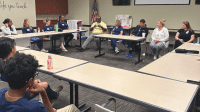As a board of nursing investigator, you protect patients and the public.
Takeaways:
- Careers in nursing regulation are a meaningful way to contribute to the protection of the public.
- Nursing investigations require critical thinking and problem-solving skills, much like clinical nursing.
- Nurse investigators review cases based on complaints in the following broad categories: practice-related, drug-related, boundary violations, sexual misconduct, abuse, fraud, and certain criminal convictions.
WHEN I was in nursing school, I didn’t have a clear understanding of what the board of nursing (BON) did in my state, but I vividly remember an instructor telling our class, “The Board is not your friend.” We then had a cursory overview of the nurse practice act (NPA) and called it a day. I didn’t realize the impact these administrative laws have on my practice or how nursing regulation affects nurses and patients all over the state. I never imagined that my nursing career would take me into investigations and regulation, but here I am, a nurse investigator for the Texas Board of Nursing.
To be a nurse investigator, you have to shift your focus from a personal, professional duty to individual patients, to a broader regulatory duty to the public. Investigating complaints against nurses and identifying state NPA violations is a challenging and meaningful way to be an advocate for safe nursing care in your home state.
BON mission and responsibility
Each state’s BON has the same mission: Protect the health, welfare, and safety of the public. Your BON might be a stand-alone agency, or it might be part of a larger government department regulating other professional licensees. BONs investigate complaints against nurses and issue disciplinary action when needed, under the statutory authority specified in the state’s NPA.
Most states have provisions for mandatory reporting of NPA violations by nurses, employers, and profes- sional liability insurers, but complaints also can come from patients, family members, coworkers, or outside agencies. Actions affecting a nurse’s license can be taken only if evidence exists to support a violation of the NPA or state regulations.
Depending on your state, the number of licensees and the investigatory load of the BON will differ, as will the types of cases that nurse investigators review.  Nurse investigators are especially vital to reviewing practice-related complaints, but they also may investigate complaints related to drugs, boundary violations, sexual misconduct, abuse, fraud, and positive criminal background checks. (See Violations by the numbers.)
Nurse investigators are especially vital to reviewing practice-related complaints, but they also may investigate complaints related to drugs, boundary violations, sexual misconduct, abuse, fraud, and positive criminal background checks. (See Violations by the numbers.)
Investigator requirements and duties
BON investigator qualifications vary depending on state needs, and some states don’t employ nurses as investigators. The minimum nurse investigator requirements (which can range from practical/vocational nurse education and licensure to master’s degree and advanced practice licensure) depend on the type of nurses your state BON employees as investigators, but all states that hire nurse investigators require an unencumbered nursing license. Your nursing knowledge and experience are indispensable when you’re evaluating nursing practice breakdown, so the more varied your professional practice, the better. However, the nursing process is a constant across the different fields of nursing, as are the minimum nursing standards stipulated in your state’s NPA. (See BON investigator training.)
Violations by the numbersThe National Council of State Boards of Nursing analyzed disciplinary actions for 52,695 nurses in 44 states over 10 years and classified the violations that resulted in discipline into 78 categories. These categories fall under three headings: practice-related conduct, unprofessional conduct, and criminal conduct. Board of nursing investigators assessed these practice violations: • failure to maintain minimal standards (5.47%) Drug-related violations (alcohol and drug misuse, drug-related convictions, writing or presenting illegal prescriptions, wastage errors, and drug diversion) represented 25% of all violations. Felony and misdemeanor convictions accounted for 8.5% of the violations that resulted in discipline. |
State laws and rules
In addition to what you already know about your NPA and the rules regulating nursing practice, you’ll become even more familiar with the law if you become a nurse investigator. Your state’s BON may have developed advisory opinions, practice guidelines, or position statements to guide nurses on specific topics and procedures of concern, such as pronouncement of death, patient abandonment, the nurse’s role in moderate sedation, and scope of practice. These guidelines will help you interpret the various rules and laws that guide nursing practice.
Current practice
Medical and technologic advances (such as stem-cell treatments, hormone therapies, social media concerns, and telemedicine) will continue to present new challenges for nurses and regulators. As an investigator, you’ll need to keep up-to-date with new treatments, medications, and practice standards in a variety of settings.
Investigative skills
You’ll function as an objective fact-finder, so you’ll need investigative skills, including evidence collection and admissibility and case development. You also might perform criminal background checks; review court records, controlled substance prescriptive monitoring profiles, nurses’ employment records, and health records; and conduct witness interviews.
Your critical-thinking and problem-solving nursing skills will support your investigative work. A strong nursing background will help you navigate health records from every possible setting and make sense of the clinical picture when evaluating cases.
BON investigator trainingIn addition to your state’s board of nursing (BON) training requirements, other options can help you develop investigatory skills. • The Council on Licensure, Enforcement and Regulation (clearhq.org/NCIT) offers basic and specialized National Certified Investigator and Inspector Training. • The National Council of State Boards of Nursing (ncsbn.org/741.htm) has developed Basic Board of Nursing Investigator Training, which is specific to investigators who work for state agencies, as well as online training (“Introduction to board of nursing disciplinary investigations”) and other investigatory resources available to members through its website. |
Day-to-day responsibilities
Daily investigator duties will vary by position and state. Your job might expand beyond an investigation to in- clude participation in settlement conferences or administrative hearings, which may require drafting legal documents, preparing exhibits, and coordinating with attorneys. During a public administrative disciplinary hearing, you might be called to testify about a case you investigated or to present the case to the BON for consideration. Preparing investigation reports and drafting legal documents that become part of the public record require strong writing skills.
Every state’s process will be different, but you’ll likely interact with the public and outside agencies. Some investigators work remotely and conduct onsite visits at medical facilities to collect documentary evidence and take statements. In addition, you may collaborate with local law enforcement, department of public safety officers, Drug Enforcement Agency (DEA) agents, state medical board personnel, and BON investigators from other states. Your week might consist of sitting at your desk researching a case to following armed DEA agents into a possible pill mill.
Pursue a challenge
Your state’s BON might not use nurses as investigators, but it might have advisor or consultant positions available for nurses. If you’re interested in a challenging career in nursing regulation and becoming an advocate for patients throughout your state, check with your BON about employment opportunities.
Danielle Green is a supervising nurse investigator for the Texas Board of Nursing in Austin.
Selected references
Blozen BB. Serving the profession. Am Nurs Today. 2017;12(12):47-8.
Brous E. Common misconceptions about professional licensure. Am J Nurs. 2012;112(10):55-9.
Council on Licensure, Enforcement & Regulation. NCIT. clearhq.org/NCIT
National Council of State Boards of Nursing. An Analysis of Nursys® Disciplinary Data from 1996-2006. 2009. ncsbn.org/09_AnalysisofNursysData_Vol39_WEB.pdf
National Council of State Boards of Nursing. Introduction to Board of Nursing disciplinary investigations. ncsbn.org/5145.htm
Russell KA. Nurse practice acts guide and govern: Update 2017. J Nurs Regul. 2017;8(3):18-25.
Texas Board of Nursing. Practice—Texas Board of Nursing position statements. bon.texas.gov/practice_bon_position_statements.asp
ant4-Investigator-325

















